De Duitse dichteres en schrijfster Katharina Hacker werd geboren op 11 januari 1967 in Frankfurt am Main. Zie ook alle tags voor Katharina Hacker op dit blog.
Uit: Die Erdbeeren von Antons Mutter
„Sie war so unglücklich, sagte Anton. Sie kennen doch meine Mutter. Immer gefaßt. Aber diesmal hat sie geweint am Telefon, weil sie vergessen hat, die Erdbeeren zu pflanzen.
Und was wollen Sie ihr weismachen? Daß es nicht zu spät ist. Daß sie es nicht vergessen hat.
Ob es richtig war, mit einer Lüge jemanden zu trösten oder glücklich machen zu wollen? Er würde seiner Mutter vorschlagen, in den Garten zu gehen, um nach den Erdbeeren zu schauen. Ihre Angst spürte er, eine Unruhe, die sich verbarg, immer wieder aufbrach, mit einem erschrockenen Reflex.
Er hatte sich zu Bett gelegt, als sie in sein Zimmer kam.
Anton?
Er sah im unregelmäßigen Licht der Straßenlaterne, die, von einer Weide halb verdeckt, vor dem Fenster stand, ihr Gesicht. Es sah männlich aus. Grobe, obenhin zusammengesetzte Flächen, scharf voneinander abgesetzt, nur die Augenpartie war verschwollen.
Mein Kind, sagte sie. Er kam sich groß vor. Da er schnell gewachsen war (mit dreizehn war er schon einen Meter achtzig groß), hatten seine Eltern ihm zum zwölften Geburtstag ein Erwachsenen-Bett geschenkt, auf das er stolz gewesen war.
Das erste Jahr, bis zu seinem dreizehnten Geburtstag, war großartig, sein Zimmer war das Zimmer nicht eines großen Jungen, sondern eines jungen Mannes. Er hatte sich so danach gesehnt, ein junger Mann zu sein. Er war ein guter Sportler, ein Schwimmer und Basketballspieler, von seiner Schwester verehrt. Von ihren Mitschülerinnen, zwei Jahre jünger als er, verehrt. Sein Haar war hell, im Nacken und an den Schläfen gelockt. Wenn er Fotos von damals sah, staunte er selbst, was für ein hübscher Junge er gewesen war.
Dann wurde er dick. Keiner konnte sich erklären, was geschah. Seine Mutter war verzweifelt.
Die Kleider paßten in der Länge, denn er wuchs nicht mehr so rasch, sie waren aber alle eng und bald zu eng.
Sie nahm ihn mit einkaufen, sie fuhren zusammen nach Braunschweig. Sie nahm ihn mit, während sie all die Jahre zuvor für ihn ohne weiteres ausgesucht hatte, was ihm gefiel.
Sein Bund mit der Welt war zerfallen.“
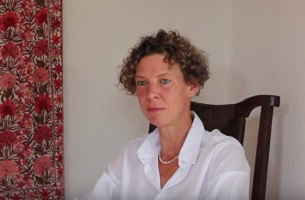
Katharina Hacker (Frankfurt am Main, 11 januari 1967)
De Britse schrijver en cameraman Jasper Fforde werd geboren op 11 januari 1961 in Londen. Zie ook alle tags voor Jasper Fforde op dit blog.
Uit: The Song of the Quarkbeast
“Pretty?’ I said, swivelling in the driver’s seat to face him, ‘you want to ask me out because I’m pretty?’ ‘Is there a problem with asking you out because you’re pretty?’ ‘I think you blew it,’ said Tiger with a grin. ‘You should be asking her out because she’s smart, witty, mature beyond her years and every moment in her company makes you want to be a better person – pretty of face should be at the bottom of the list.’ ‘Oh, blast,’ said Perkins despondently. ‘It should, shouldn’t it?”
(…)
“After almost two hours, the phone rang. I could guess who it was.
“Hello, Blix,” I said before he could say anything. “Adding kidnapping to your long list of felonies?”
“We prefer to think of it as ‘vacationing at the specific invitation of His Majesty,” replied Blix. “Open the top drawer of the bureau.”
I did so, and found a contract for Kazam to concede the competition, with all the details that Blix had already outlined. The document had been prepared by a law firm in Financia and registered with the Ununited Kingdoms Supreme Court, so even if King Snodd had wanted to reverse the deal, he couldn’t.
“It’s all there,” said Blix. “I knew my or the King’s word wouldn’t be good enough, so I made it official. Sign it and your vacation in the North Tower is over.”
“And if I don’t?”
“Then you’ll stay there until six Mondays from now, and we’ll have Kazam for nothing.”
“Blix?”
“Yes?”
“Are you in the castle watching the top of the North Tower at the moment?”
“I might be.”
I ripped the phone from the wall and tossed it out the open window. The telephone took almost five seconds to hit the ground. It was a pointless gesture, but very satisfying.”
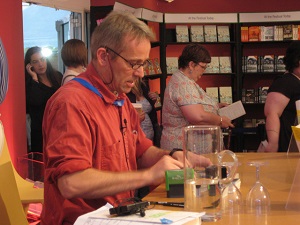
Jasper Fforde (Londen, 11 januari 1961)
De Amerikaanse schrijver, sportjournalist en oorlogscorrespondent W. C. Heinz werd geboren op 11 januari 1915 in Mount Vernon, New York. Zie ook alle tags voor W. C. Heinz op dit blog.
Uit: Death of a Racehorse
“When will you do it?” one of them said.
“Right as soon as I can,” the doctor said. “As soon as I get confirmation. If it was an ordinary horse I’d done it right there.”
He walked across the road and around another barn to where they had the horse. The horse was still in the van, about twenty stable hands in dungarees and sweat-stained shirts, bare-headed or wearing old caps, standing around quietly and watching with Dr. M.A. Gilman, the assistant veterinarian.
“We might as well get him out of the van,” Catlett said, “before we give him the novocaine. It’ll be a little better out in the air.”
The boy in the van with the colt led him out then, the colt limping, tossing his head a little, the blood running down and covering his left foreleg. When they saw him, standing there outside the van now, the boy holding him, they started talking softly.
“Full brother of Assault.” … “It don’t make no difference now. He’s done.” … “But damn, what a grand little horse.” … “Aint he a horse?”
“It’s a funny thing,” Catlett said. “All the cripples that go out, they never break a leg. It always happens to a good-legged horse.”
A man, gray-haired and rather stout, wearing brown slacks and a blue shirt, walked up.
“Then I better not send for the wagon yet?” the man said.
“No,” Catlett said. “Of course, you might just as well. Max Hirsch may say no, but I doubt it.”
“I don’t know,” the man said.
“There’d be time in the morning,” Catlett said.
“But in this hot weather—” the man said.
They had sponged off the colt, after they had given him the shot to deaden the pain, and now he stood, feeding quietly from some hay they had placed at his feet. In the distance you could hear the roar of the crowd in the grandstand, but beyond it and above it you could hear thunder and see the occasional flash of lightning.”
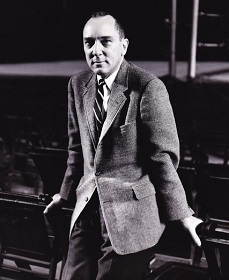
W. C. Heinz (11 januari 1915 – 27 februari 2008)
De Griekse dichter, schrijver en zeeman Nikos Kavvadias werd geboren op 11 januari 1910 in Nikolski Ousouriski. Zie ook alle tags voor Nikos Kavvadias op dit blog.
Bitterness
I’d forgotten her, the little girl from Amoi
and the mulatto who stank of wine in Tenerif.
Love that’s reckoned in a wooden hut
and the old woman who tots up the bill in inches.
The purple of Titian and permanganate.
I forgot all about the ramshackle beds
with their dirty sheets used a hundred times,
for your body that banished the fear of death.
I denied what I loved for your bitter lips:
the trembling I felt as I climbed the mast,
the compass, my watch, the course on the map,
for a small, elusive shell from the sea.
The fever in the tropics, the clap in Rio,
the fire we started one day in Manao,
the Magyar who stabbed me that time in Constanza
and “Do you ache in the Southerly?” No, somewhere else.
The pain of the fisherman, loneliness of the sailor,
the broken bow of a boat gone aground.
The faded tattoos I took such pride in,
for you, who weighed anchor, a fully-rigged schooner.
How can I hold you, intractable child?
My kit-bag is my comfort’s my comfort in Asia, America.
A wire cut in two and how can I splice it?
Miserable wretch, the sea hates betrayal.
Polygyros came down and became a harbor,
a dark, narrow harbour without any lights,
tonight when the Jews and Muslims embraced
and the Canary Islands sailed the ocean.
You ‘re only fit for weights on your feet
old man. Two meters of sail, wheel left.
A medusa eyed you, it’s drawing near
and a sea-bed where rays and octopus graze.
Vertaald door Gail Hoist Warhaft.
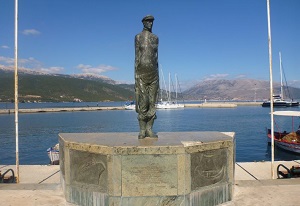
Nikos Kavvadias (11 januari 1910 – 10 februari 1975)
Standbeeld bij de haven van Sami
De Nederlandse (sport)journalist, schrijver en radio- en televisiepresentator Martinus Jan (Mart) Smeets werd geboren in Arnhem op 11 januari 1947. Zie ook alle tags voor Mart Smeets op dit blog.
Uit:For the record – Het boek
“Het antwoord is makkelijk: ja. Hoe kom je erbij om een geluidje uit 1947 (Young was toen ruim een jaar oud) in 2014 te gebruiken voor songs uit de jaren 50, 60 en 70? Hoe kan je, als bedenker van het audioproduct Pono, dat sublieme techniek voorstaat, ineens met een krakend product van A Letter Home naar voren komen? Omdat het ‘kunst’ is? Of omdat Neil Young doet wat hij altijd gedaan heeft: zijn eigen gang gaan? Voor diegenen die de laatste cd’s van Young gekocht hebben (en dan heb ik het over Le Noise, Americana en Psychedelic Pill en een serie live concerten van eeuwen oud) is dit weer een i8o graden wending. Young zelf noemde het, in een kort persbericht, een ‘retro tech pro-ject’. De muziekwereld kan, als het zo doorgaat, binnen een halfjaar weer iets anders verwachten. In de tussen-tijd reist hij in Europa rond en jaagt hij met de gierende klanken van The Crazy Horse over al onze podia. Omdat hij het leuk vindt te doen wat in hem opkomt. Het belangrijkste begrip dat me blijft beheersen is verbazing. De man die een paar jaar geleden bijna dood in New York op straat lag, verbaast ons nog steeds met zijn muziek. Als je hem nu het Willie Nelson-nummer ‘On the road again’ hoort zingen, trekt een lange, trage glimlach over je gezicht, dat kan toch niet anders. Maar een goed luisterbaar album? Neen!”

Mart Smeets (Arnhem, 11 januari 1947)
De cover van Neil Youngs “A Letter Home” op YouTube
De Braziliaanse schrijver Oswald de Andrade werd geboren op 11 januari 1890 in São Paulo. Zie ook alle tags voor Oswald de Andrade op dit blog.
Frontier
I want to study philosophy in Paris.
That can’t happen
Only if your godfather Antunes pays your way
But life is good anyhow
Godfather Antunes went bankrupt
Life is good
Godfather Antunes died
Mute old church-bell,
you slow your rhythm in a panic
and speed up your ringing
in a rebellion
The seed sprouts with no announcement
The man in the mask will fill your table with joys
That’s not going to happen
But life is good anyhow
Poet, you were born destined for liberty;
what a waste to meet the Shepherd? Christmas Star.
Hierofant
It’s impossible to live
with these people
or with anybody at all
Suspicion surrounds you like an escutcheon
Dye the scarab
red
and paint the dawn’s directions
Sighing multitudes will come from far away
to attend the plangent calf
Vertaald door Flavia Vidal

Oswald de Andrade (11 januari 1890 – 22 oktober 1954)
Affiche
De Spaanse schrijver Eduardo Mendoza werd geboren in Barcelona op 11 januari 1943. Zie ook alle tags voor Eduardo de Mendoza op dit blog.
Uit: An Englishman in Madrid (Vertaald door Nick Caistor)
“The art collection belongs to the wealthy Duke of Igualada, but the paintings Anthony values turn out to be worthless. The duke’s beautiful, bewitching daughter Paquita, however, shows him the real treasure which is hidden in the basement: a hitherto unknown Velasquez, and what’s more it appears to be the artist’s own personal – and more revealing – version of the Rokeby Venus. Anthony believes it to be genuine, which not only means that it is worth a fortune, but it will also guarantee his renown as an art historian for its discovery.
At first Anthony is led to believe the money raised by its sale will finance the family’s relocation to the safety of England, then he learns that it may be to buy arms for the quasi-fascist group the Falange, led by Jose Antonio Primo de Rivera, a handsome and charismatic lawyer and a close friend of the duke’s family. He is also Paquita’s suitor, and Whitelands is drawn into vying for her favours with him.
The Spanish civil guard put Anthony under surveillance, as do Soviet spies, the Falange and the British Embassy. Anthony becomes the lens through which opposing factions can keep an eye on each other, and he is caught in a web of spying, rumour and deception. Mendoza skilfully weaves the changing allegiances and political complexities of the time throughout the narrative to create an atmosphere of distrust and paranoia, with the mounting threat of civil war dominating everyone’s motives and actions. This atmosphere of foreboding in a country on the brink of civil war is superbly realised, though at times the narrative is burdened with overlong accounts of one political figure or another.
Nevertheless, this is an engaging comic novel in which our rather ridiculously naive innocent abroad, manipulated by others, finds himself in one predicament after another until his life comes under threat. For all his protestations that as an Englishman he has no opinion about the future of Spain and wishes to take no side, circumstances won’t let him sit on the fence. Though the historic elements of the story are certainly authentic, some turns of the plot seem like unnecessary and unbelievable complications, as when Anthony becomes involved with La Tonina, a child prostitute, and the narrative develops farcical overtones, with Anthony at one point having to hide her in the wardrobe in his hotel room.”
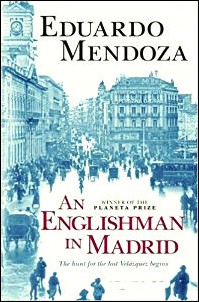
Eduardo Mendoza (Barcelona, 11 januari 1943)
Cover
De Amerikaanse schrijfster Diana Gabaldon werd op 11 januari 1952 geboren in Williams, Arizona. Zie ook alle tags voor Diana Gabaldon op dit blog.
Uit: Written In My Own Heart’s Blood
“Ian Murray stood with a stone in his hand, eyeing the ground he’d chosen. A small clearing, out of the way, up among a scatter of great lichened boulders, under the shadow of firs and at the foot of a big red cedar; a place where no casual passerby would go, but not inaccessible. He meant to bring them up here — the family.
Fergus, to begin with. Maybe just Fergus, by himself. Mam had raised Fergus from the time he was ten, and he’d had no mother before that. Fergus had known Mam longer than Ian had, and loved her as much. Maybe more, he thought, his grief aggravated by guilt. Fergus had stayed with her at Lallybroch, helped to take care of her and the place; he hadn’t. He swallowed hard and, walking into the small clear space, set his stone in the middle, then stood back to look.
Even as he did so, he found himself shaking his head. No, it had to be two cairns. His mam and Uncle Jamie were brother and sister, and the family could mourn them here together — but there were others he might bring, maybe, to remember and pay their respects. And those were the folk who would have known Jamie Fraser and loved him well but wouldn’t ken Jenny Murray from a hole in the —
The image of his mother in a hole in the ground stabbed him like a fork, retreated with the recollection that she wasn’t after all in a grave, and stabbed again all the harder for that. He really couldn’t bear the vision of them drowning, maybe clinging to each other, struggling to keep —
“A Dhia!” he said violently, and dropped the stone, turning back at once to find more. He’d seen people drown.
Tears ran down his face with the sweat of the summer day; he didn’t mind it, only stopping now and then to wipe his nose on his sleeve. He’d tied a rolled kerchief round his head to keep the hair and the stinging sweat out of his eyes; it was sopping before he’d added more than twenty stones to each of the cairns.
He and his brothers had built a fine cairn for their father before he died, at the head of the carved stone that bore his name — all his names, in spite of the expense — in the burying ground at Lallybroch. And then later, at the funeral, members of the family, followed by the tenants and then the servants, had come one by one to add a stone each to the weight of remembrance.”
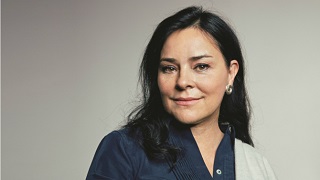
Diana Gabaldon (Williams,11 januari 1952)
De Macedonische dichter en schrijver Slavko Janevski werd geboren op 11 januari 1920 in Skopje. Zie ook alle tags voor Slavko Janevski op dit blog.
Markings
This race,
this wonderful race!
Here it kisses the hangman
with a golden noose round its neck;
here for a fistful of mulberries
it fights to the blood with a brother;
here it gets drunk with rage,
foaming at the mouth,
here it plucks the live heart
from a dove.
This race,
this wonderful race!
In its furrows
under the sun awakens
a flower with a biblical name:
Mother-of-God’s-heart.
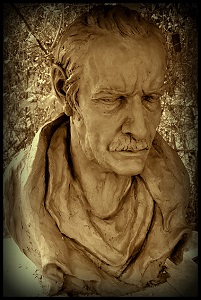
Slavko Janevski (11 januari 1920 – 20 januari 2000)
Borstbeeld door Nataša Bozarova
Zie voor nog meer schrijvers van de 11e januari ook mijn blog van 11 januari 2017 en ook mijn blog van 11 januari 2015 en ook mijn blog van 11 januari 2016 deel 2.
Zie voor bovenstaande schrijvers ook mijn blog van 11 januari 2007 en ook mijn blog van 11 januari 2008 en eveneens mijn blog van 11 januari 2009.
